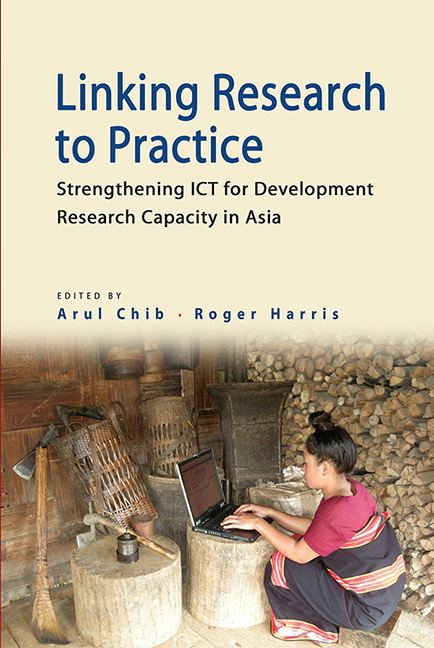Book contents
- Frontmatter
- Contents
- List of Tables
- List of Figures
- Foreword
- Preface
- Acknowledgement
- SECTION I MANAGEMENT PERSPECTIVES: INSIDERS' THOUGHTS ON THE PROGRAMME
- SECTION II RESEARCH PERSPECTIVES: THEORETICAL REFLECTIONS BY EXPERTS
- 5 ICTD Praxis: Bridging Theory and Practice
- 6 Messy Methods for ICT4D Research
- 7 Ethics and ICTD Research
- 8 ICTD Curriculum Development and Professional Training: Mainstreaming SIRCA Research Models
- 9 Multi-stakeholder Perspectives Influencing Policy-Research-Practice
- 10 From Production… To Dissemination… To Adoption
- SECTION III RESEARCH OUTPUTS
- SECTION IV SYNTHESIS AND CONCLUSION
- About the Contributors0
- Index
7 - Ethics and ICTD Research
from SECTION II - RESEARCH PERSPECTIVES: THEORETICAL REFLECTIONS BY EXPERTS
Published online by Cambridge University Press: 21 October 2015
- Frontmatter
- Contents
- List of Tables
- List of Figures
- Foreword
- Preface
- Acknowledgement
- SECTION I MANAGEMENT PERSPECTIVES: INSIDERS' THOUGHTS ON THE PROGRAMME
- SECTION II RESEARCH PERSPECTIVES: THEORETICAL REFLECTIONS BY EXPERTS
- 5 ICTD Praxis: Bridging Theory and Practice
- 6 Messy Methods for ICT4D Research
- 7 Ethics and ICTD Research
- 8 ICTD Curriculum Development and Professional Training: Mainstreaming SIRCA Research Models
- 9 Multi-stakeholder Perspectives Influencing Policy-Research-Practice
- 10 From Production… To Dissemination… To Adoption
- SECTION III RESEARCH OUTPUTS
- SECTION IV SYNTHESIS AND CONCLUSION
- About the Contributors0
- Index
Summary
INTRODUCTION
The ethics of ICTD research are important and challenging for both emergent and established researchers. The reasons for the importance of research ethics are simple and obvious but still worth enumerating. Basically, research that does not conform to explicit ethical guidelines may be:
1. seen as improper or immoral
a. attracting opprobrium and condemnation
2. breaking laws or regulations
a. attracting litigation and prosecution
3. unacceptable to the research community
a. affecting funding, publication and promotion
This chapter reviews the nature of the challenges facing ICTD researchers seeking to work ethically, firstly from the conventional institutional perspective and then from community perspectives including those of online communities.
ETHICS: THE BACKGROUND
Before we look at ethics in the context of research and of ICTD, we need to review some basic and accepted ideas. According to Farrow (2011, p. 102) ethics is, “developing a systematic understanding of why particular behaviours are (or should be) considered right or wrong.” This sounds simple, clear and obvious. However, “Ethical concepts are slippery and complicated, and for many it's natural to lapse into either a kind of lazy ethical relativism (‘follow your own path’) or to conform to ‘the rules’ or mores as we find them” (2011, p. 103). “Furthermore, the diversity of mobile devices and their contexts of application can make it very difficult to anticipate and make a judgement about ethical issues that might arise. This means that the advice given in general ethical guidance is often vague and non-transferable (2011, p. 104). This is not just a function of the rapidity of technical change — Farrow is specifically talking about mobile technologies but his remarks are true of all ICTs — but also of the rapidity of appropriation by cultures and sub-cultures.
- Type
- Chapter
- Information
- Linking Research to PracticeStrengthening ICT for Development Research Capacity in Asia, pp. 68 - 81Publisher: ISEAS–Yusof Ishak InstitutePrint publication year: 2012

